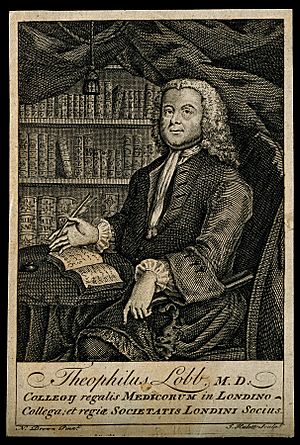Theophilus Lobb facts for kids
Theophilus Lobb (born 1678, died 1763) was an interesting English person who was both a doctor and a religious writer. He spent his life helping people with their health and sharing his religious ideas.
Life Story
Theophilus Lobb was born in London on August 17, 1678. His father was Stephen Lobb. His mother was the daughter of Theophilus Polwhele, a nonconformist minister. Nonconformists were people who didn't follow the official Church of England.
Young Theophilus first studied to become a minister. He trained under Thomas Goodwin the younger in Pinner, Middlesex. Around 1702, he became a nonconformist minister in Guildford, Surrey. While there, he met a doctor who taught him about medicine.
Around 1706, Lobb moved to Shaftesbury in Dorset. This is where he started working as a doctor. In 1713, he moved to Yeovil, Somerset. He was a successful doctor there, but he also continued his work as a minister.
Because of some disagreements in his church in Yeovil, he moved to Witham, Essex, in 1722. On June 20 of that year, he earned his M.D. (Doctor of Medicine) degree from the University of Glasgow. This was a big achievement! He was also accepted as a Fellow of the Royal Society on March 13, 1729. This meant he was recognized for his scientific work.
In 1732, Lobb was asked to lead a church in London. However, his ministry didn't quite work out there. So, from about 1736, he focused mostly on being a doctor. On September 30, 1740, he was allowed to practice medicine in London by the Royal College of Physicians.
On May 21, 1762, he received a special patent. This patent was for a "tincture" (a type of medicine) that he created. It was meant to help keep blood healthy and prevent certain problems.
Theophilus Lobb passed away in London on May 19, 1763. He was buried in Bunhill Fields.
His Writings
Theophilus Lobb wrote many books and papers. He wrote both about religion and about medicine.
Religious Books
His religious writings included:
- A Brief Defence of the Christian Religion: This book explained why he believed in the Christian religion.
- Sacred Declarations: This was a letter to people in Great Britain. It talked about sins that he believed caused sickness among cattle and earthquakes.
- Letters on the Sacred Predictions: This book was about religious prophecies.
- An Answer to the Question, whether it be lawful to go to Plays: This discussed if it was okay for people to go to plays.
- A Dialogue between a Master and his Servants concerning the Sin of Lying: This was a conversation about why lying is wrong.
Medical Books
He also wrote many important medical books, such as:
- A Treatise of the Small-pox: This book was about the smallpox disease.
- Rational Methods of Curing Fevers: This explained logical ways to treat fevers.
- A Treatise on Dissolvents of the Stone: This book discussed how to treat kidney stones and gout.
- A Practical Treatise of Painful Distempers: This was about how to cure painful illnesses.
- Letters concerning the Plague: This book gave advice on how to avoid getting infected by the plague.
- The Good Samaritan, or Complete English Physician: This was a guide for doctors.
- Medical Principles and Cautions: This book shared important medical rules and warnings.
After Lobb died, his brother-in-law, John Greene, published a book in 1767. It was called The Power of Faith and Godliness exemplified in some Memoirs of Theophilus Lobb. This book mostly contained parts from Lobb's own diary.
His Family
Theophilus Lobb was married twice. His first wife was Frances Cooke, who passed away in 1722. His second wife, whose name isn't mentioned, died in 1760. Theophilus Lobb did not have any children. In his will, he left the money earned from his special tincture medicine to his niece, Elizabeth Buckland.
 | Bessie Coleman |
 | Spann Watson |
 | Jill E. Brown |
 | Sherman W. White |


